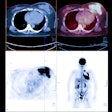Cardinal Health of Dublin, OH, announced that it is supporting the American College of Radiology Imaging Network's (ACRIN) nationwide clinical trials with PET to determine if radiotracers such as F-18 fluoromisonidazole (FMISO), F-18 sodium fluoride (NaF), and F-18 fluorothymidine (FLT) can be used to assess the efficacy of cancer treatments.
Cardinal Health is supporting four ACRIN trials:
- A clinical trial to determine whether FMISO can be used as a biotracer to measure the oxygen level (or hypoxia) of glioblastomas. Cardinal Health has a drug master file with the U.S. Food and Drug Administration (FDA) to produce FMISO.
- A clinical trial to determine whether the bone imaging agent F-18 NaF can be used to gain information about how the drug dasatinib may work in treating castration-resistant prostate cancer that has spread to the bone.
- Two clinical trials to assess FLT-PET. One trial will evaluate its ability to assess whether chemotherapy treatments have been successful in reducing tumors prior to surgery in patients with locally advanced breast cancer. The second trial will use FLT-PET and advanced MRI sequences to assess whether imaging biotracers can be useful in predicting the likelihood of survival among patients with glioblastoma tumors.
In other Cardinal news, on June 4, the company announced a collaboration with the University of Washington in Seattle to further the use of molecular imaging agents in clinical trials. The university's department of radiology will relocate a portion of its on-campus molecular tracer laboratories into Cardinal Health's PET manufacturing facility in downtown Seattle.
Co-locating in the same physical space will combine the university's PET R&D experience with Cardinal's expertise in FDA-compliant production and distribution of PET imaging agents, allowing them to accelerate the research, development, and commercialization of new molecular imaging agents.
The University of Washington laboratories that are part of the move will include one operated by John Grierson, who developed F-18 FLT, which Cardinal now distributes. The university's radiology department will also have access to Cardinal's cyclotron, radiopharmaceutical products, and research support services.
Related Reading
Cardinal sees sparse Tc-99m supplies in May, May 14, 2010
Cardinal warns of May Tc-99m shortages, May 3, 2010
MIS buys Cardinal nuke labs, August 21, 2009
Cardinal Health acquires Biotech, August 3, 2009
Cardinal opens PET cyclotron in Nebraska, March 16, 2009
Copyright © 2010 AuntMinnie.com




















